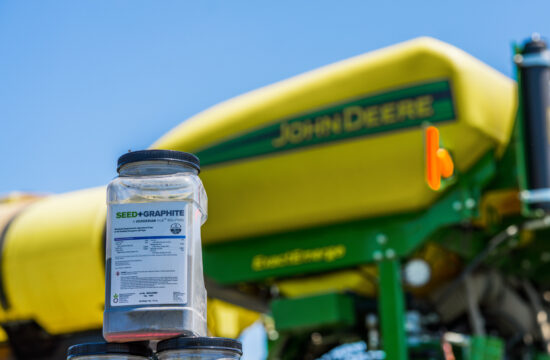Every season has its own characteristics that can cause crop stress – weather, disease pests, soil changes, field variables and soil microbiome. In a down market, maximizing yield potential of crops is a top priority, and crop stress can negatively impact yield potential and ROI. What are some tools to improve crop stress tolerance?
A Science Direct article says it’s estimated that adverse environments cause an overall yield loss of approximately 70 percent. The stress can then reduce plant health, which causes deficiencies in the plant’s ability to get what it needs to grow. The plant growth slows to adapt to the stressful conditions, and it goes into “power save” mode and repairs damaged cells from the stress.
Biostimulants Help Protect Against Environmental Stresses
With the potential to lose yield and ROI, it’s important to help protect crops against the inevitable environmental stresses. Biostimulants such as SEED+GRAPHITE® are one tool that can help influence a plant’s response to stress and adverse environmental changes. Increasing germination and root development can stimulate plant growth and allow plants better access to water and minerals. Biostimulants can also foster photosynthetic activity and carbohydrate production to help mitigate abiotic stressors for the plant.
Biostimulants protect against several abiotic stressors, such as:
- Cold temperatures: Biostimulants support emergence and germination during cold stress conditions and can help improve plant density.
- Hot temperatures: Plant growth, photosynthesis, pollen development and reproduction are all impaired by high temperatures, and biostimulants help those functions continue despite the heat stress.
- Excess moisture: Excess moisture reduces oxygen supply to the roots, which limits the plant’s ability to absorb nutrients and water. Additionally high moisture conditions promote disease growth. Biostimulants can help the plant continue to absorb nutrients and water, as well as make the plant more resistant to disease.
- Drought: In drought stress, plants suppress and delay germination. Several plant processes are impaired, including photosynthesis, chlorophyll synthesis, nutrient uptake, translocation and metabolism, as well as carbohydrate synthesis. Biostimulants support plant processes to continue in drought conditions.
- UV Radiation: Excessive UV radiation reduces photosynthesis, which decreases crop productivity. Biostimulants help increase plant growth and increase carbon assimilation to help crops maximize growth and development despite high UV radiation.
Nutritional Supplements Help Plant Resiliency
Certain nutritional supplements such as CROP+™ reduce the effects of abiotic stress through high antioxidant activity and improve plant resiliency to stress. When a plant is stressed, it can slow natural genetic expression, nutrient uptake, metabolism and photosynthesis. Nutritional supplements support the plant in all those areas to create a more resilient and healthy plant.
Moisture-Retaining Soil Additives Improve Water Access
Moisture-retaining soil additives improve the soil’s capacity to hold water even in dry regions and drought conditions. They also promote healthy root development, which helps the plant’s ability to reach the water in the soil.
No matter the environmental stressor, tools exist to help support plants throughout the growing season. The first step is to identify the environmental stressor or stressors and find solutions that can mitigate those conditions to maximize plant health, growth and productivity – as well as ROI.
Verdesian Solutions
At Verdesian, we use the latest science to transform agriculture and improve the health of crops. Our products are used in a wide range of crops to maximize yield, improve crop quality, increase nutrient availability, and much more. Contact us today to learn more!


